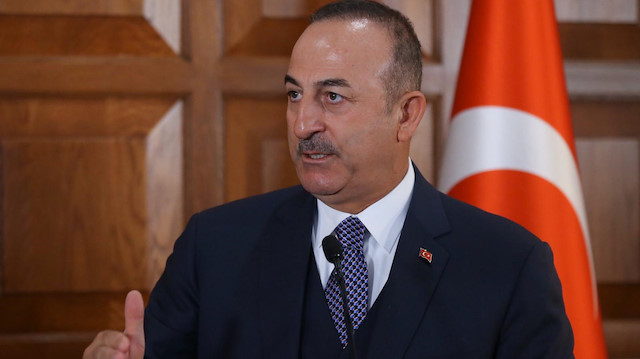
Turkish Foreign Minister says what is wanted for Baltics should be wanted for Turkey as well, as threats to Turkey coun
NATO should address the concerns of all the members of the alliance, as Turkey deserves what other regions get too, said Turkey's foreign minister on Thursday.
"NATO must act in a way that will meet the concerns of all allies. What is wanted for the Baltics should be wanted for us too," Mevlüt Çavuşoğlu told a press conference in the capital Ankara with Masrour Barzani, the visiting prime minister of Iraq’s Kurdish Regional Government (KRG).
Turkey has recently taken issue with NATO failing to recognize the threat it faces from the terrorist YPG/PKK along its southern border, in northern Syria.
Çavuşoğlu added that Turkey has told both Iraq’s central government and the KRG in northern Iraq about its expectations about the continued presence of the terrorist groups YPG/PKK and the Fetullah Terrorist Organization (FETÖ), the group behind the 2016 defeated coup.
"There 350,000 Kurds in Turkey, and more than 250,000 Syrian Kurds in Iraq right now. They are not able to return to Syria because the PKK/YPG exiled them," he added.
For his part, Barzani said his country opposes the presence of the PKK terror group in Sinjar and other parts of Iraq.
PKK terrorists often use northern Iraq as base to plan cross-border terror attacks in Turkey.
In its more than 30-year terror campaign against Turkey, the PKK -- listed as a terrorist organization by Turkey, the U.S. and the European Union -- has been responsible for the deaths of 40,000 people, including women, children and infants. The YPG is the PKK's Syrian offshoot.
FETÖ and its U.S.-based leader Fetullah Gulen orchestrated the defeated coup on July 15, 2016, which left 251 people martyred and nearly 2,200 injured.
Ankara also accuses FETÖ of being behind a long-running campaign to overthrow the state through the infiltration of Turkish institutions, particularly the military, police, and judiciary.
Turkey's maritime boundaries agreement with Libya is aimed at protecting Ankara's rights under international law, Çavuşoğlu said on Thursday, a day after the deal was signed in Istanbul.
At a news conference, he said Turkey had been unable to agree such deals with some other countries but could do so in the future.
The accord could further complicate disputes over energy exploration in the eastern Mediterranean where Turkish drilling has angered Greek Cypriots, Athens and the European Union.



